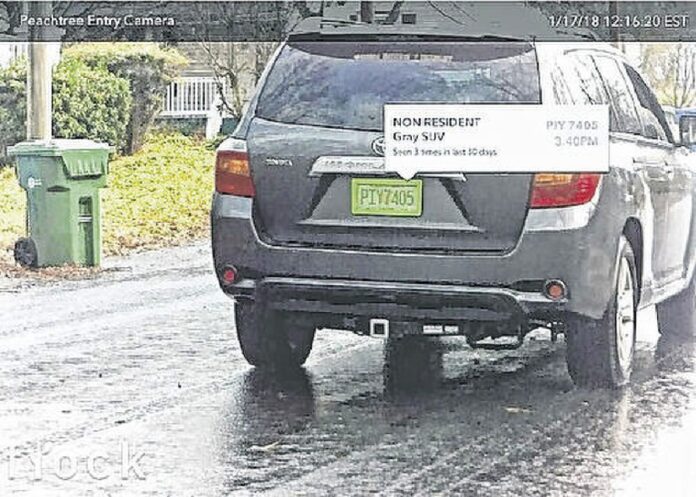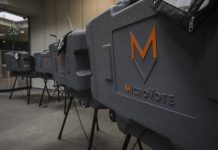
The Bartholomew County Sheriff’s Department says sufficient safeguards will ensure that a recently purchased camera system that uses artificial intelligence to read and record the license plate numbers and other features of vehicles entering the county will only be used for law enforcement purposes.
The camera system, made by Atlanta-based Flock Safety, captures still images of every vehicle that comes into view and uploads them to a “cloud” server. The machine-learning algorithms analyze the images, log a range of information about the vehicle and send alerts to deputies of any vehicles that have been flagged for suspected involvement in a crime, company officials said.
The information collected includes the license plate number and state, the color, make and model, “unique details” such as roof racks and bumper stickers, as well as the date and time of the image and how many times the vehicle has passed by the cameras over the past month. The cameras will not capture images of the vehicle’s occupants, and all data and photos are permanently deleted after 30 days.
The Bartholomew County Commissioners approved testing four Flock Safety cameras for one year and agreed to pay $5,000 of the $11,000 total price tag to deploy the system in Bartholomew County. The sheriff’s department will foot the rest of the bill.
The cameras, which are not capable of measuring vehicle speed, will be installed at four locations across the county, including U.S. 31 near Interstate 65 on the north side, State Road 7 on the east side, U.S. 31 on the south side and State Road 46 on the west side, said Capt. Chris Roberts, commander of the Detective’s Bureau of the Bartholomew County Sheriff’s Department. Roberts oversaw the acquisition of the cameras.
Locally, the cameras will be configured to automatically alert deputies to any vehicle that passes by and is suspected to be tied to an Amber or Silver alert for missing persons, has been reported stolen, believed to be have been used to commit a crime or the registered driver has a felony warrant, Roberts said.
The cameras will only notify deputies of vehicles flagged by law enforcement as they enter Bartholomew County. They do not track where people go once they are within the county limits or when the vehicles leave the county.
The sheriff’s department hopes to install the cameras sometime in the next couple of months, though no specific dates have been set, Roberts said.
Once installed, the cameras will be tested for 60 days. When that period ends, the Bartholomew County Council will be asked to include the cameras in next year’s budget. If approved, the cameras will be tested for an additional year.
Over the course of the year, the sheriff’s department plans to track the extent to which they are aiding deputies with investigations, with routine audits being performed on who at the department is using the system, what searches were done and the reasons for them to ensure that the photos are only being used for law enforcement purposes, Roberts said.
“I’m looking to see how they work for us in the county and what they provide us,” Roberts said. “So I don’t know if in 60 days we’ll be able to say 100% that, ‘Yeah, these are a good fit or not.’ But I think over the year we should have enough data to come back and have a real good idea about that.”
How the system works
The system uses a set a cameras that are programmed to take multiple still images of every vehicle that passes by, according the Flock Safety’s website. The company claims that the cameras can capture clear images of vehicles traveling up to 100 miles per hour — during the day and at night — at a distance of up to 75 feet.
The images are automatically uploaded to an encrypted “cloud” server operated by Amazon Web Services within seconds after the pictures are taken. Once in the “cloud,” the images are analyzed by machine learning algorithms that read and store the license plates and categorize other features of the vehicles.
The images and other data collected are then automatically uploaded to Flock Safety’s online portal, where sheriff’s deputies can log in to perform searches and create their own “hotlist” of vehicles that will trigger an alert sent to law enforcement officials if the wanted vehicle passes by one of the cameras. Users are also prompted to provide a reason for the search before submitting a search.
A recent demonstration of Flock Safety’s user interface by IPVM, a video surveillance industry news organization that often conducts product tests, showed that users can perform a wide range of searches, including by full or partial license plate numbers, make, model and color, among other criteria.
Locally, the system will draw upon vehicle information entered by police into the Indiana Data and Communications System, or IDACS, which is the statewide system used by law enforcement agencies that integrates information from national crime databases. Law enforcement agencies already use that database to run plates manually.
If the system spots a vehicle that has been flagged, it will send a notification to deputies that they can access via the computer in each squad car.
However, at least initially, only deputies in the sheriff’s department’s investigation division will be able to perform vehicle search through the system, Roberts said.
“The only thing they capture is the license plate and a picture of the back of the vehicle and stuff like that. We’re not going to use them for traffic enforcement or anything like that. …These cameras are lead information. They are just notifying us that we have a potential vehicle,” he said.
Privacy concerns
The camera system that Bartholomew County Sheriff’s Department plans to install is part of a growing industry of networked AI-powered technology, including automatic license plate readers, that are capable of tracking vehicles as they move across the country, advocacy groups say.
Flock Safety, for instance, claims that its cameras capture more than 1 billion vehicle images each month across more than 1,000 cities in 40 states and specifically advertises them to law enforcement, enticing them to “cover your city with cameras that see like a detective,” according to the company’s website.
Privacy rights groups, including the American Civil Liberties Union and Electronic Frontier Foundation, characterize the technology as a form of mass surveillance and have expressed concern that the cameras track vehicles — whether they have been flagged by police or not — and the technology has the potential to be abused.
The system also can connect cameras in multiple cities, meaning, for example, that Indianapolis police, which also has Flock Safety cameras, could perform a vehicle search that pulls in results that include images captured with cameras installed in Bartholomew County, and vice versa.
“If there’s one thing that we’ve learned from the growing use of automated license plate readers across the country is that these things are not incredibly targeted,” said Matthew Guariglia, a policy analyst at the Electronic Frontier Foundation. “…For the most part, those cameras are on and they are recording every license plate that goes by, and so this includes the innocent and the guilty alike. And, of course, 99.9% of those people are innocent.”
“What automated license plate readers represent is the tracing of their movement as they go about their day,” Guariglia added.
However, the companies that make the systems, including Flock Safety, have said they take privacy “very seriously” and that privacy “is at the core of our design and factored into every product decision.”
Additionally, Flock Safety says that its customers own all of the images they capture through its system and that no vehicle data is sold to third parties.
“We are in the business of solving crime, not monitoring or tracking driving patterns,” the company states on its website. “Our customers know that the footage is to be used for an active investigation in solving a crime.”
And police departments across the country say the technology has been helpful at generating investigative leads and solving crimes that may have otherwise gone unsolved, pointing to what they describe as success stories. Some have claimed the cameras deter crime.
For example, Wichita police attributed the recovery of 68 stolen cars, 39 stolen license plates, 39 felony arrests, as well as the seizure of 13 guns, methamphetamine and other drugs in a little over a month, to automatic license plate readers, The Wichita Eagle reported.
Roberts said deputies are required to have a “law enforcement reason” to use the system and that routine audits will be done to make sure the system is being used as intended.
“You just can’t run a search without having a reason,” Roberts said. “Flock’s and our policy requires that to do a specific search on a vehicle, that you have to be in some kind of investigation. That is logged and then, of course, there will be an audit to make sure everything is in compliance.”
Other concerns have involved the accuracy of these systems. In a recent product test, IPVM found that Flock Safety’s cameras were very accurate at reading license plate numbers, but at times, did mis-classify the license plate state, vehicle type and make, including one instance where a yellow Nissan Xterra was identified as a bus.
But Bartholomew County Sheriff’s deputies won’t take the alerts from the system at face value and will conduct an investigation before taking action, Roberts said.
“The officers still have to take that information and make contact with that individual and verify all that stuff personally,” Roberts said. “…Basically, it’s a little faster than someone calling us on 911, saying ‘I’m behind a stolen vehicle’ or ‘I believe I just saw the vehicle in the Amber alert and it’s going down State Road 46.’ And that’s the same thing that this (camera system) is going to do. It will just tell us ‘Here’s a vehicle, here’s what we believe.’”
[sc:pullout-title pullout-title=”Where to learn more” ][sc:pullout-text-begin]
To learn more about Flock Safety, visit https://www.flocksafety.com.
[sc:pullout-text-end]




